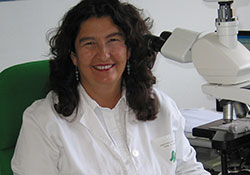Dr Sofía Vázquez Navarrete is a specialist pathologist and the head of the Laboratory of Pathological Anatomy at the hospital of La Línea de la Concepción, Spain

Ana Diaz Lagama
“I have been a medical doctor in Spain for 29 years. I considered going to work in England some years ago, when the National Health System was looking for doctors with specialties. I was offered three times more money than I earn in Spain, and at the time my children were studying English in an international college. However, I didn’t go because it would have involved too many changes in my life, not to mention the climate they have there! I love my area of work and I love living near the beach in Andalusia!
On the whole, I believe that the Spanish health system is good and compares well with similar systems in other countries. The Spanish Government has made social wellness, health, education and social policies a priority. The financing of the system is totally public, with funds allocated from the central government. This public financing makes the system more equitable, in comparison to a system financed by private funding, where even if the system is good, it doesn’t always reach all sectors of society equally, which would be terrible.
However, I am aware that the system is not perfect. It is true that there are long waiting lists – people are sometimes kept waiting for months. Also, people do not like to come to a hospital, and feel lost as soon as they pass through the reception area. They dislike being asked to bring more and more papers; they feel mistreated if consultation rooms are relocated or changed without notice, and many patients dislike being introduced to and treated by a different doctor every time. This is just a result of the overcrowded system.
In general, though, when surveys are conducted asking about patient satisfaction, patients are usually happy with the care received from doctors and nurses. Their complaints refer to the waiting lists, comfort, bureaucracy, etc. Besides, patients in Spain are not helped in their pursuit of contentment and satisfaction by the mere fact that they live in a society where sickness and death are not accepted as natural situations. Youth, health and beauty are the models in rich countries now, aren’t they?
I also deeply dislike the tremendous bureaucracy, which imposes a burden on the health system. I dislike the way the hospitals are run as enterprises (which they are not) and the application of market techniques, achievement of objectives, etc., which give priority to impressive figures and statistics over patient care. I don’t consider patients as mere ‘users’ or ‘clients’. I also think that dealing with conceptually new health policies, without engaging in dialogue with the doctors who work daily on the front line, is unreasonable. It produces confusion and disappointment and, in many cases, doctors abandon public health in quest of better paid jobs in the private sector.
In my hospital, some sections lack sufficient funds. I very often have to fight with the finance managers, and eventually, with time and patience, I achieve what I need. I am proud to say that my laboratory does not envy any other laboratory of the same category, even in the United States.”



